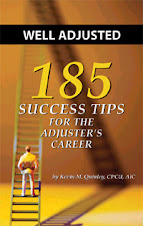-- THE NIGHT BEFORE CHRISTMAS, LEGALLY SPEAKING --
Whereas, on or about the night prior to Christmas, there did occur at a certain improved piece of real property (hereinafter "the House") a general lack of stirring by all creatures therein, including, but not limited to a mouse.
A variety of foot apparel, e.g. stocking, socks, etc., had been affixed by and around the chimney in said House in the hope and/or belief that St. Nick a/k/a/ St. Nicholas a/k/a/ Santa Claus (hereinafter "Claus") would arrive at sometime thereafter.
The minor residents, i.e. the children, of the aforementioned House were located in their individual beds and were engaged in nocturnal hallucinations, i.e. dreams, wherein vision of confectionery treats, including, but not limited to, candies, nuts and/or sugar plums, did dance, cavort and otherwise appear in said dreams.
Whereupon the party of the first part (sometimes hereinafter referred to as "I"), being the joint-owner in fee simple of the House with the parts of the second part (hereinafter "Mamma"), and said Mamma had retired for a sustained period of sleep. (At such time, the parties were clad in various forms of headgear, e.g. kerchief and cap.)
Suddenly, and without prior notice or warning, there did occur upon the unimproved real property adjacent and appurtenant to said House, i.e. the lawn, a certain disruption of unknown nature, cause and/or circumstance. The party of the first part did immediately rush to a window in the House to investigate the cause of such disturbance.
At that time, the party of the first part did observe, with some degree of wonder and/or disbelief, a miniature sleigh (hereinafter "the Vehicle") being pulled and/or drawn very rapidly through the air by approximately eight (8) reindeer. The driver of the Vehicle appeared to be and in fact was, the previously referenced Claus.
Said Claus was providing specific direction, instruction and guidance to the approximately eight (8) reindeer and specifically identified the animal co-conspirators by name: Dasher, Dancer, Prancer, Vixen, Comet, Cupid, Donner and Blitzen (hereinafter "the Deer"). (Upon information and belief, it is further asserted that an additional co-conspirator named "Rudolph" may have been involved.)
The party of the first part witnessed Claus, the Vehicle and the Deer intentionally and willfully trespass upon the roofs of several residences located adjacent to and in the vicinity of the House, and noted that the Vehicle was heavily laden with packages, toys and other items of unknown origin or nature. Suddenly, without prior invitation or permission, either express or implied, the Vehicle arrived at the House, and Claus entered said House via the chimney.
Said Claus was clad in a red fur suit, which was partially covered with residue from the chimney, and he carried a large sack containing a portion of the aforementioned packages, toys, and other unknown items. He was smoking what appeared to be tobacco in a small pipe in blatant violation of local ordinances and health regulations.
Claus did not speak, but immediately began to fill the stocking of the minor children, which hung adjacent to the chimney, with toys and other small gifts. (Said items did not, however, constitute "gifts" to said minor pursuant to the applicable provisions of the U.S. Tax Code.)
Upon completion of such task, Claus touched the side of his nose and flew, rose and/or ascended up the chimney of the House to the roof where the Vehicle and Deer waited and/or served as “lookouts." Claus immediately departed for an unknown destination.
However, prior to the departure of the Vehicle, Deer and Claus from said House, the party of the first part did hear Claus state and/or exclaim: "Merry Christmas to all and to all a good night!"





